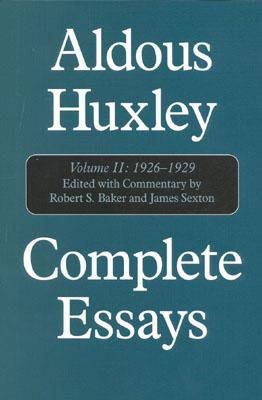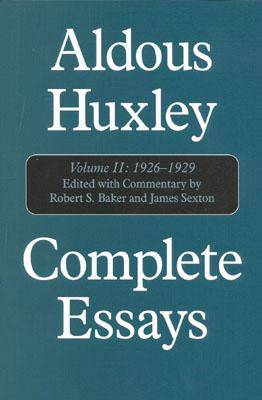
- Afhalen na 1 uur in een winkel met voorraad
- Gratis thuislevering in België vanaf € 30
- Ruim aanbod met 7 miljoen producten
- Afhalen na 1 uur in een winkel met voorraad
- Gratis thuislevering in België vanaf € 30
- Ruim aanbod met 7 miljoen producten
Zoeken
€ 53,45
+ 106 punten
Omschrijving
These first two volumes of a projected five, in preparation for several years, begin a major publishing venture, collecting the complete essays of one of the giants of modern English prose and of social commentary in our time. The first two volumes span the most productive period of Huxley's career. Volume I begins with his essays for Gilbert Murray's Athenaeum and his music essays for the New Westminster Gazette. Volume II continues through the 1920s and includes his controversial essays on India and the empire in "Jesting Pilate." The essays of both volumes range from nuanced assessments of art and architecture to political analyses, history, science, religion, and art, and a newly discovered series on music. Wide-ranging, allusive, and witty, they are informed by the probing skepticism of a highly educated and ironically incisive member of the English upper middle class. Huxley's fascination with the codes and conventions of European culture, his growing apprehensions about the menacing collapse of the European political order, and his awareness of the impact of science and technology on the post-Versailles world of England, France, Germany, and the United States form the basis for his critique. His subjects overlap with the satirical novels he wrote during the period between the wars, culminating in Point Counter Point and Brave New World. At their best, these essays stand among the finest examples of the genre in modern literature.
Specificaties
Betrokkenen
- Auteur(s):
- Uitgeverij:
Inhoud
- Aantal bladzijden:
- 607
- Taal:
- Engels
Eigenschappen
- Productcode (EAN):
- 9781566633239
- Verschijningsdatum:
- 7/11/2000
- Uitvoering:
- Hardcover
- Formaat:
- Genaaid
- Afmetingen:
- 165 mm x 242 mm
- Gewicht:
- 1016 g

Alleen bij Standaard Boekhandel
+ 106 punten op je klantenkaart van Standaard Boekhandel
Beoordelingen
We publiceren alleen reviews die voldoen aan de voorwaarden voor reviews. Bekijk onze voorwaarden voor reviews.











